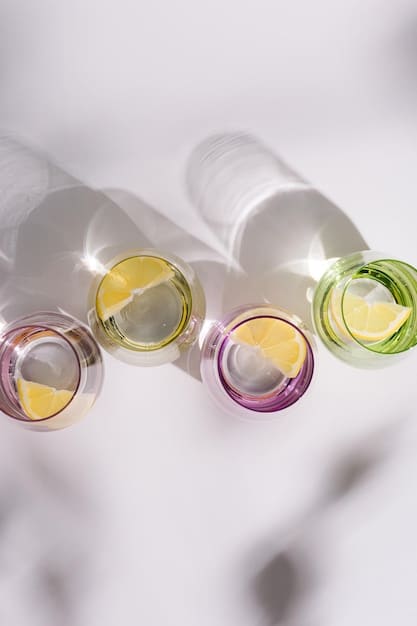Is Your Skincare Routine Aging You? Expert Tips for a Youthful Glow in 2025

Many skincare routines designed to promote youthfulness can inadvertently accelerate aging due to common missteps and outdated practices, making it crucial to adopt expert-backed strategies and product selections for a truly radiant and age-defying glow in 2025.
In the quest for a timeless complexion, endless products and routines promise a youthful glow. Yet, a surprising truth often remains hidden: is your skincare routine actually aging you? We’ll delve into expert tips for maintaining a truly
The Surprising Culprits: How Your Skincare Might Be Working Against You
The journey to youthful skin is often paved with good intentions, but sometimes, even the most dedicated routines can unknowingly contribute to accelerated aging. Understanding these subtle yet significant missteps is the first step toward correcting them and unveiling a truly revitalized complexion.
One primary culprit lies in the pursuit of instant gratification. Many individuals, eager to see immediate results, fall prey to harsh treatments or an overload of active ingredients. While exfoliation and potent serums have their place, overdoing it can strip the skin’s natural barrier, leading to increased sensitivity, inflammation, and premature fine lines. The skin’s delicate ecosystem is designed to protect and repair itself, and constant disruption hinders these vital processes.
Over-Exfoliation: A Common Misstep
Over-exfoliation, for instance, is a widespread issue. While it promises to reveal fresher skin, excessive scrubbing or frequent use of strong chemical exfoliants can damage the lipid barrier, leaving skin vulnerable to environmental stressors. This vulnerability can manifest as:
- Increased redness and irritation.
- Unwanted dryness and flakiness.
- Heightened sun sensitivity, leading to more photoaging.
- A duller complexion, paradoxically.
Another often-overlooked factor is product incompatibility. Mixing too many active ingredients without proper knowledge can lead to a cocktail of irritation rather than synergy. For instance, combining high concentrations of Vitamin C with retinoids without proper phasing can diminish their individual efficacy and increase skin sensitivity. It’s not just about what you use, but how you use it together.
Finally, neglecting foundational steps in favor of trendy treatments also plays a role. A robust sunscreen, consistent moisturizing, and gentle cleansing remain the pillars of any effective anti-aging routine. Without these basics, even the most expensive serums will struggle to deliver their full potential, leaving your skin unknowingly susceptible to daily damage and premature aging.
Building Blocks for Youth: Essential Skincare Habits for 2025
Achieving a youthful glow in 2025 isn’t about chasing the latest fad; it’s about establishing fundamental habits that consistently support skin health. Think of your skin as a complex organ that thrives on consistency, nourishment, and protection. Neglecting any of these can subtly undermine your efforts, creating a domino effect that prematurely ages your complexion.
The cornerstone of any effective routine begins with proper cleansing. This may seem obvious, but many people either over-cleanse or use cleansers that are too harsh. A gentle, hydrating cleanser used twice daily removes impurities without stripping essential oils, preserving the skin’s delicate barrier. The goal is a clean canvas, not a squeaky-clean, tight feeling that signals damage.
Hydration: More Than Just a Moisturizer
Hydration extends beyond topical creams. While a good moisturizer is crucial, incorporating hydrating serums with ingredients like hyaluronic acid can draw moisture into the skin, plumping it from within. Don’t forget internal hydration too – adequate water intake is vital for overall skin health and elasticity. Lack of hydration can make fine lines more pronounced and dull your complexion, giving an aged appearance.
- Choose hydrating cleansers.
- Layer hyaluronic acid serums.
- Drink plenty of water daily.
- Consider a humidifier, especially in dry climates.
Sun protection remains non-negotiable. Daily SPF 30 or higher, even on cloudy days or indoors near windows, is the single most effective anti-aging measure. UV radiation is responsible for up to 80% of visible skin aging, including wrinkles, dark spots, and loss of elasticity. This isn’t just a summer habit; it’s a year-round commitment to preserving your skin’s youthful structure.
Finally, consistency is key. Erratic routines or frequently switching products prevent your skin from adapting and benefiting fully. Give new products time to work (typically 4-6 weeks) before evaluating their effectiveness. A steady, well-chosen routine performed regularly will yield far greater, lasting results than sporadic, intense treatments.
Decoding Ingredients: What to Look for (and Avoid) in 2025 Skincare
Navigating the complex world of skincare ingredients can feel overwhelming, but understanding what to look for—and what to avoid—is paramount for maintaining a youthful complexion in 2025. The right ingredients can transform your skin, while the wrong ones can silently work against your anti-aging goals.
When it comes to boosting collagen, reducing fine lines, and improving skin texture, there are a few star players you should always have on your radar. Retinoids, including retinol and prescription-strength tretinoin, are widely regarded as the gold standard for anti-aging. They accelerate cell turnover, stimulate collagen production, and improve hyperpigmentation. Start slowly, as they can cause initial irritation, and always pair them with SPF.

Antioxidants: Your Skin’s Defense Shield
Antioxidants are another non-negotiable category. They combat free radicals caused by environmental aggressors like pollution and UV radiation, which are major contributors to premature aging. Vitamin C is a particularly potent antioxidant that also brightens skin and boosts collagen. Other beneficial antioxidants include Vitamin E, ferulic acid, and green tea extract.
- Vitamin C: Brightens skin, boosts collagen, protects against free radicals.
- Retinoids: Accelerate cell turnover, reduce wrinkles, improve texture.
- Niacinamide: Reduces inflammation, minimizes pores, strengthens skin barrier.
- Hyaluronic Acid: Provides intense hydration, plumps skin.
On the flip side, some ingredients, though sometimes present in formulations, can hinder your anti-aging efforts. Harsh sulfates, common in foaming cleansers, can strip the skin’s natural oils, leading to dryness and irritation. Similarly, excessive amounts of denatured alcohol in toners or serums can dehydrate the skin over time, making fine lines more apparent and compromising the skin barrier.
Fragrance, whether synthetic or natural, can also be problematic, especially for sensitive skin types. It’s a common irritant and allergen that can lead to inflammation and redness, which contribute to aging in the long run. Opt for fragrance-free formulations whenever possible to minimize potential sensitivities and keep your skin calm and receptive to beneficial ingredients.
Beyond the Bottle: Lifestyle Factors for Timeless Skin
While skincare products play a vital role in maintaining a youthful glow, they are only one piece of the puzzle. What you do and how you live significantly impact your skin’s health and appearance. Embracing a holistic approach that integrates healthy lifestyle choices with your topical routine is essential for truly timeless skin in 2025.
Sleep is often underestimated as a beauty secret. During sleep, your body, including your skin, undergoes repair and regeneration. Poor sleep disrupts these processes, leading to dullness, dark circles, and a compromised skin barrier. Aim for 7-9 hours of quality sleep each night to allow your skin to rejuvenate and produce fresh, healthy cells. Think of it as your skin’s nightly reset button.
Nutrition: Fueling Your Skin from Within
Your diet directly influences your skin’s vitality. A nutrient-rich diet, abundant in fruits, vegetables, lean proteins, and healthy fats, provides the essential building blocks for collagen production, antioxidant defense, and overall skin cell function. Foods high in antioxidants, like berries, leafy greens, and nuts, help combat oxidative stress, a key contributor to aging. Conversely, excessive sugar and processed foods can lead to inflammation, breaking down collagen and elastin over time.
- Prioritize fruits and vegetables high in antioxidants.
- Include healthy fats like avocado and olive oil for skin elasticity.
- Consume lean proteins for collagen synthesis.
- Limit sugar and processed foods to reduce inflammation.
Stress management is another critical factor. Chronic stress triggers a cascade of hormonal responses that can negatively impact skin health, leading to increased inflammation, breakouts, and accelerated aging. Incorporating stress-reducing practices—like meditation, yoga, regular exercise, or spending time in nature—can significantly improve your skin’s resilience and youthful appearance.
Lastly, regular physical activity boosts circulation, delivering vital oxygen and nutrients to skin cells, and promoting a healthy, radiant complexion. It also helps manage stress and improve sleep quality, creating a virtuous cycle for skin health. Even moderate exercise, like a daily brisk walk, can make a noticeable difference in your skin’s overall glow and firmness.
The 2025 Skincare Forecast: Innovations for a Radiant Future
As we advance into 2025, the skincare landscape is continually evolving, bringing forth exciting innovations designed to push the boundaries of anti-aging and skin health. Staying informed about these advancements can help you refine your routine and leverage cutting-edge science for a truly radiant future.
One major trend gaining traction is personalized skincare, driven by AI and diagnostic tools. Companies are increasingly offering DNA-based or skin-sampling services that analyze individual skin needs, genetic predispositions, and environmental factors. This allows for the creation of truly bespoke product formulations, ensuring ingredients are perfectly matched to your skin’s unique requirements, rather than a one-size-fits-all approach.
Biotech Ingredients and Sustainable Practices
The rise of biotech ingredients is also transforming formulations. We’re seeing more lab-grown epidermal growth factors (EGF), peptides, and plant stem cells that are highly potent and sustainably sourced. These ingredients are engineered for maximum efficacy, targeting specific aging concerns with precision, such as improved skin barrier function, enhanced collagen production, and accelerated wound healing. The focus is shifting towards smart, bio-mimetic ingredients that work in harmony with the skin’s natural processes.
- AI-driven personalized routines: Tailored products based on individual skin diagnostics.
- Advanced peptides and growth factors: Lab-engineered for superior anti-aging results.
- Microbiome-friendly skincare: Products supporting a healthy skin flora.
- Sustainable and ethical sourcing: A growing emphasis on eco-conscious ingredient procurement.
Furthermore, the dermis is becoming a key area of focus, with innovations aimed at strengthening the skin barrier through microbiome-friendly ingredients. Prebiotics and postbiotics are being incorporated into formulations to foster a healthy skin flora, which is crucial for defending against environmental damage and reducing inflammation. A balanced microbiome is increasingly understood as foundational to a youthful complexion.
Beyond ingredients, advancements in delivery systems are also enhancing product efficacy. Encapsulation technologies ensure active ingredients remain potent until they reach their target cells, maximizing their impact while minimizing irritation. We can expect even more sophisticated patches, devices, and targeted applications that deliver powerful actives exactly where they’re needed most, ensuring your routine is not just effective but also highly efficient in achieving that desired youthful glow.
Addressing Common Mistakes: What to Stop Doing Now
The path to youthful skin is often as much about what you stop doing as what you start. Many common skincare habits, though seemingly innocuous, can silently undermine your anti-aging efforts, contributing to dullness, irritation, and premature fine lines. Identifying and correcting these missteps is a crucial step toward achieving a truly radiant glow.
One of the most pervasive mistakes is inconsistent sun protection. Many people diligently apply SPF during summer but neglect it in colder months or on cloudy days. UV radiation penetrates clouds and windows year-round, contributing significantly to photoaging, dark spots, and collagen breakdown. Make daily SPF 30+ a non-negotiable step, regardless of the weather or your indoor status.

Skipping Neck and Décolletage Care
Another frequently overlooked area is the neck and décolletage. These delicate areas often show signs of aging earlier than the face due to thinner skin and less oil glands, yet they are frequently neglected in anti-aging routines. Extend your facial skincare—including serums, moisturizers, and especially SPF—down to your neck and chest to ensure a cohesive and youthful appearance, preventing a noticeable age disparity.
- Stop scrubbing your skin aggressively.
- Avoid sleeping with makeup on your face.
- Don’t pick at blemishes or dry patches.
- Refrain from using excessively hot water for cleansing.
Using products that are too harsh or too many active ingredients concurrently can also do more harm than good. While the temptation to layer multiple potent serums is understandable, combining ingredients like strong retinoids, AHAs, and high concentrations of Vitamin C without proper knowledge or skin tolerance can lead to irritation, redness, and a compromised skin barrier. Simplicity and strategic layering often yield better results than an overly aggressive approach.
Finally, neglecting to clean your makeup brushes and pillowcases can lead to bacterial buildup, breakouts, and inflammation, all of which stress the skin and contribute to an aged appearance. Regularly cleaning these items helps maintain skin hygiene, preventing unnecessary irritation and allowing your skincare products to work more effectively for a truly youthful and clear complexion.
Personalizing Your Journey: Tailoring Skincare to Your Unique Needs
In the vast world of skincare, what works for one person may not work for another. The most effective anti-aging strategy in 2025 isn’t about following a generic script, but rather about personalizing your routine to suit your unique skin type, concerns, and lifestyle. This tailored approach ensures maximum efficacy and prevents unwanted side effects.
Understanding your skin type—whether it’s oily, dry, combination, or sensitive—is the foundational step. Each type has distinct needs: oily skin benefits from lighter formulations, while dry skin thrives on rich, emollient textures. Sensitive skin requires gentle, fragrance-free products, and combination skin demands a balanced approach, sometimes treating different areas differently. Using products incompatible with your skin type can exasperate issues and hinder your anti-aging goals.
Responding to Skin Concerns and Environmental Factors
Beyond basic type, identify your primary skin concerns. Are you battling fine lines, hyperpigmentation, loss of firmness, or persistent breakouts? Prioritizing these concerns allows you to select targeted active ingredients efficiently. For example, if hyperpigmentation is a major issue, Vitamin C and alpha arbutin might take precedence, while firming might call for peptides and retinoids.
- Skin Type Assessment: Determine if your skin is oily, dry, combination, or sensitive.
- Targeted Concern Focus: Prioritize specific issues like wrinkles, dryness, or spots.
- Seasonal Adjustments: Modify your routine based on climate and humidity.
- Professional Guidance: Consult dermatologists or estheticians for personalized advice.
Environmental factors also play a significant role in personalization. If you live in a dry climate, you’ll need more hydrating and barrier-supportive products than someone in a humid environment. Urban dwellers might benefit from enhanced antioxidant protection to combat pollution. Your lifestyle, including diet, stress levels, and sun exposure, should also inform your product choices and routine adjustments.
Finally, consider consulting with a dermatologist or a qualified esthetician. These professionals can offer invaluable personalized advice, perform advanced skin analyses, and recommend specific medical-grade treatments or product lines tailored to your exact needs. Their expertise can help you navigate ingredient complexities and ensure your routine is truly optimized for a youthful, healthy glow in 2025.
In the end, achieving a truly ageless complexion isn’t about finding a magic bullet, but about empowering yourself with knowledge and making informed choices. It’s an ongoing dialogue with your skin, observing its responses, and gently guiding it toward its healthiest, most vibrant state.
| Key Takeaway | Brief Description |
|---|---|
| 🧴 Gentle Cleansing | Avoid harsh cleansers and over-exfoliation to protect skin barrier. |
| ☀️ Daily SPF | Non-negotiable for preventing photoaging, even indoors. |
| 🥦 Holistic Approach | Combine good sleep, nutrition, and stress management with products. |
| 🧬 Smart Ingredients | Focus on retinoids, Vitamin C, and peptides; avoid irritants. |
Frequently Asked Questions About Anti-Aging Skincare
It’s beneficial to start protecting your skin from aging in your early 20s, focusing on prevention. This includes daily sunscreen use, gentle cleansing, and proper hydration. Incorporating antioxidants like Vitamin C can also be highly effective in maintaining a youthful complexion and preventing early signs of aging before they become prominent.
Absolutely. A diet rich in antioxidants, healthy fats, and lean proteins can significantly impact your skin’s youthfulness. Foods like berries, leafy greens, avocados, and fatty fish provide essential nutrients that combat free radical damage, support collagen production, and maintain skin elasticity. Limiting sugar and processed foods is also crucial for reducing inflammation.
While skincare products, especially those containing retinoids, Vitamin C, and peptides, can significantly improve the appearance of fine lines, wrinkles, and hyperpigmentation, they rarely offer a complete reversal of advanced aging signs. For more dramatic results, professional treatments like lasers or injectables might be combined with a consistent, potent skincare routine. Prevention is always easier than reversal.
The ideal frequency for exfoliation depends on your skin type and the type of exfoliant (physical vs. chemical). Generally, 1-3 times a week is sufficient for most people. Over-exfoliation can compromise your skin barrier, leading to irritation, dryness, and increased sensitivity. Listen to your skin and adjust as needed, opting for gentle formulations.
Without a doubt, daily sun protection is the single most important step. UV radiation is the primary cause of premature skin aging, including wrinkles, dark spots, and loss of firmness. Consistent use of a broad-spectrum SPF 30 or higher, applied generously and reapplied as needed, forms the foundation of any effective anti-aging strategy. It truly is your skin’s best defense.
Conclusion
The journey to a youthful glow in 2025 is less about magic solutions and more about informed choices and consistent practices. By understanding how certain habits might inadvertently age your skin and embracing a holistic approach that combines smart product choices, diligent sun protection, and a healthy lifestyle, you can cultivate a complexion that truly reflects vitality and timeless beauty. It’s about empowering your skin to thrive, not just survive.





